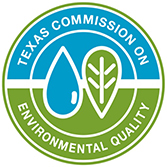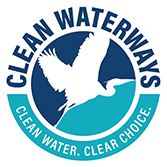POLLUTION SOLUTIONS

WE CAN ALL DO OUR PART TO PROTECT OUR WATERWAYS.
The next time you are taking care of your yard, remember to keep yard debris out of storm drains. Storm drains are designed to carry rain water away from our streets and into our local bayous.
Your yard is a piece of Earth that is directly connected to everyone else’s. You can decrease the runoff from lawns that carries topsoil and chemicals into streams and lakes that we rely on for drinking water. You can also reduce erosion, improve water and air quality, and conserve limited resources for generations to come.
YOU CAN HELP!
INLET MEDALLIONS
Recently you may have noticed small medallions on Storm Water inlets in your neighborhood. We put these on to make sure everyone is aware of how important it is to keep storm water clean and as a reminder not to dump anything in the storm water inlets.
Storm water runoff from urban areas can carry pollutants and trash into the storm water drainage system. Water that flows down the drains in our homes first goes to sewage treatment facilities before it’s released to bayous and rivers. But, water that flows into our storm water drainage system, along with other substances it collects, goes directly into our bayous, rivers, and ultimately into Galveston Bay. Unlike sewage, storm water receives no treatment.
Storm water inlet markers bearing the SMCSWC logo anc a message stating “No Dumping, Flows to Galveston Bay” were recently installed. The message will remind citizens not to dump pollutants into storm sewers or contribute to ordinary storm water runoff by littering, over-fertilizing, or sweeping yard debris into the street. All these materials can also clog up the drains causing localized flooding. There is a phone number on the medallions for you to report Violators, so we can protect the cleanliness of our storm water, streams, rivers, lakes and ultimately Galveston Bay. That number is 281-292-4642
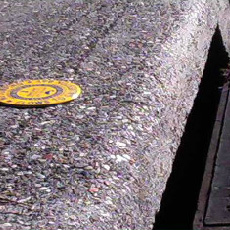
CLEAN WATER STARTS WITH YOUR YARD
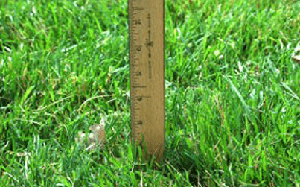
Proper Lawn Mowing
Mow the top 1/3 of your lawn and leave the grass clippings on your lawn to decompose into the soil. Leaving your clippings on your lawn, provides about 2 pounds of nitrogen per 1,000 square feet of lawn per year, along with a perfect balance of essential nutrients that aren’t included in most chemical fertilizers. This will save you both time and money, and provide you with a nicer lawn. Keep in mind that your yard is a piece of Earth that is directly connected to everyone else’s. You can decrease the runoff from your lawn that carries topsoil and chemicals into streams and lakes that we rely on for drinking water. You can also reduce erosion, improve water and air quality, and conserve limited resources for generations to come.
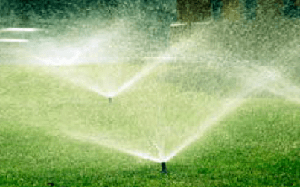
Over Watering
Don’t over water your lawn. Much of the water applied to lawns and gardens is never absorbed by plants. Water applied too rapidly is lost as runoff, which may carry polluting fertilizers and pesticides to our bayous and lakes. Do not water in the heat of the day as much of the water is lost to evaporation. Early mornings are the best time to water, when permitted.
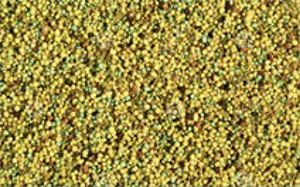
Fertilizer
Use the correct amount of fertilizer, more isn’t better. Costly synthetic fertilizers and pesticides are applied to compensate for the loss of nutrients and protection once provided by organic debris and rich soil life. As your soil loses its organic matter, it allows more of these chemicals to run off and wash through it—contributing to the pollution of lakes, streams, and underground water. Instead, use a “soil amendment” or make your own compost.
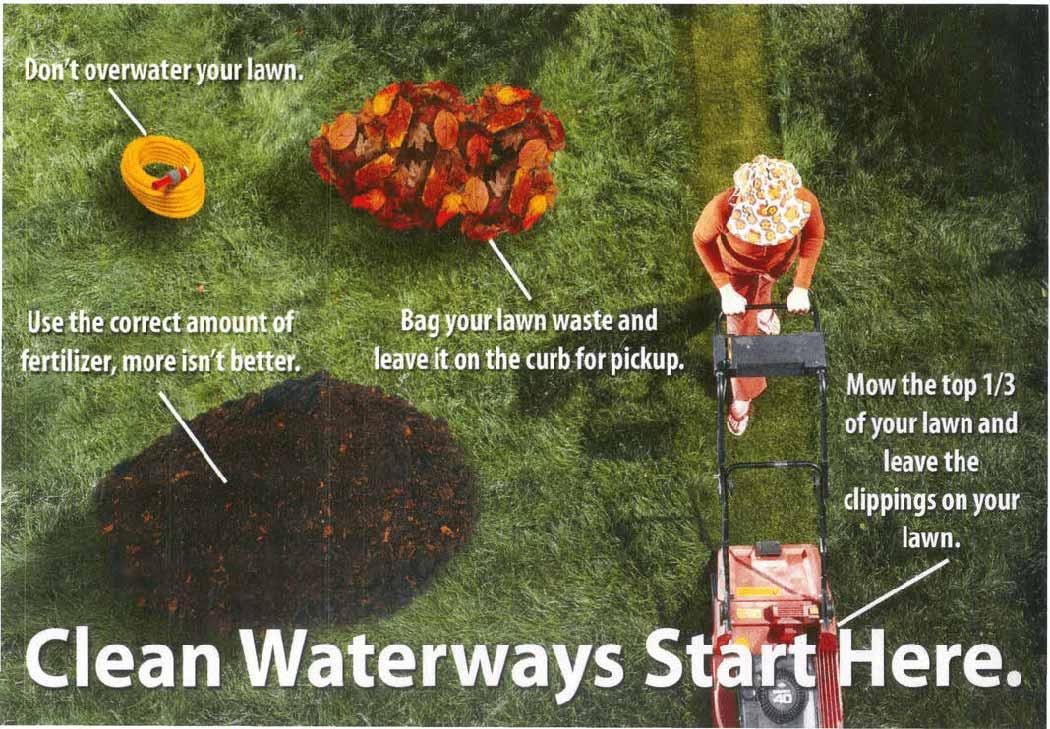
FOG (FATS, OILS, & GREASE)
HOW FOG EFFECTS THE ENVIRONMENT
Fats, oils, and grease (FOG) are a major environ-mental problem in cities across Harris County. When you discard your cooking oil into your kitchen sink, it accumulates inside the sewer pipes making it difficult for wastewater to flow freely to the waste-water treatment plant.
When wastewater cannot make its way through the sewer pipes, it overflows into our homes, streets, lawns and storm drains. Storm drains carry rainwa ter away from homes, and anything that is thrown on the street goes untreated to our water sources such as our bayous, lakes, and Galveston Bay. You can help us keep our water running clean by learn-ing how to dispose of your cooking oil and grease properly.
There are many things that you can do to prevent fats, oils, and grease from entering our waterways. First, we’ll describe some of the myths about the proper disposal of FOG. Then, we’ll provide ideas on how to keep fats, oils, and grease out of our waterways.
MYTHS ABOUT FOG
Myth: Wash grease with dish soap
Fact: Even though soap breaks up . grease, it loses its effectiveness downstream, allowing grease to solidify on pipe walls.
Myth: Running hot tap water will help grease float in the sewer pipe
Fact: Running hot tap water will NOT help grease float through
the sewer pipe because the water will eventually cool as it flows through the pipe and the grease will become solid again.
Myth: Pour cooking oil at room temperature
Fact: Cooking oil such as canola and olive float on water and adhere to the sewer pipes. It is best to avoid pouring oil down the drain altogether to avoid sewage problems.
DISPOSE OF FOG PROPERLY
Most household plumbing lines are small, and con-nect directly to pipes that are only slightly larger. When fats, oils, and grease are present in these small pipes, they block the sewage flow. A blocked sewer pipe can cause overflow into homes and streets polluting our waterways including Galveston Bay.
Here is what you can do to protect our natural environment and keep our water free from fats, oils, and grease.
- Take liquid oils to your local Household Hazardous Waste facility. This is the best way to get rid of all your fats, oils, and grease.
- Pour liquid oils and grease at room temperature into heat resistant plastic bags or old containers such as plastic milk containers, water bottles, or glass jars. Once the container is full, seal it and throw it away with your regular trash.
- Scrape fats, grease and food from plates and cooking utensils into the trash can before wash-ing them or placing them in your dishwasher. Use basket strainers in sinks to catch any food particles and empty the contents in the trash.
WHAT ABOUT OIL FROM CARS?
Did you know that used oil from a single oil change can pollute up to one million gallons of freshwater? Improper disposal of used oil, which includes oil leaking from cars parked in drive-ways, contributes to storm water pollution. When oil leaks from cars parked in our driveways, it is washed off as runoff into the storm drains after a rain shower. The water and everything that goes into the storm drain enter our local·waterways untreated, polluting our water and endangering marine life.
How to minimize car fluids from entering our waterways:
- Check your car for oil and fluid drips and fix any leaks as soon as possible.
- If there is a spill, use sawdust or cat litter for clean-up and dispose of it properly.
- Use a drip pan under your vehicle if you have a leak or are doing engine work.
- Recycle used motor oil. Contact your local auto supply store or Household Hazardous Waste (HHW) facility in your city.
POLLUTING OUR WATERWAYS IS A CRIMINAL OFFENSE!
DON’T DO THIS!
Do not pour oil or grease into storm drains.
Take liquid oils to your local Household Hazardous Waste facility. This is the best way to get rid of all your fats, oils, and grease.
Pour liquid oils and grease at room temperature into heat resistant plastic bags or old containers such as plastic milk containers, water bottles, or glass jars. Once the container is full, seal it and throw it away with your regular trash
Do not sweep leaves and grass into storm drains.
Bag your lawn waste and leave it on the curb for pickup.
Sweep up clippings and fertilizer from paved surfaces and dispose of them properly.
Rake leaves and grass clippings out of the street and gutter. You can also collect leaves and grass clippings for mulching or composting.
DUTIES OF ENVIRONMENTAL LAW ENFORCEMENT
To enforce the laws of the State of Texas.
Keep unauthorized vehicles off of district property to maintain it at the highest possible level.
Watch for illegal dumping and educate residents about illegal dumping and contamination of the DD6 and DD #10 drainage water and property.
To provide a safe place for residents and their families to walk, bike, and enjoy their natural beauty.
They can be contacted at 936-760-5800 or 281-389-2921. If you see violations or suspect problems in the DD6 area, please call Officer Ford or report the violation to the Montgomery County Sheriff’s Dispatch.
Sgt. Barry or Officer Craig can be contacted at 936-760-5800 or 713-816-8766. If you see violations or suspect problems in the DD6 area, please call Sgt. Barry or report the violation to the Montgomery County Sheriff’s Dispatch.
CRIMINAL OFFENSES & PENALTIES
DUMPING USED OIL
- Texas Water Code. Section 7.176
- A person intentionally discharges used oil or knowingly disposes of or otherwise handles any used oil within the State of Texas in violation of the rules for used oil
- Each day is a separate violation
- Fine of not less than $1.000 or more than $50,000 and/or imprisonment up to five years
WATER POLLUTION
- Texas Water Code. Section 7.145
- A person intentionally or knowingly discharges or permits the discharge of a waste or pollutant into or adjacent to water in the state that causes or threatens to cause water pol I ution without strict compliance with all required permits or other authorization: Water in the state includes drainage ditches and storm water sewers
- Each day is a separate violation
- Imprisonment up to five years and/or a fine up to $100.000.


